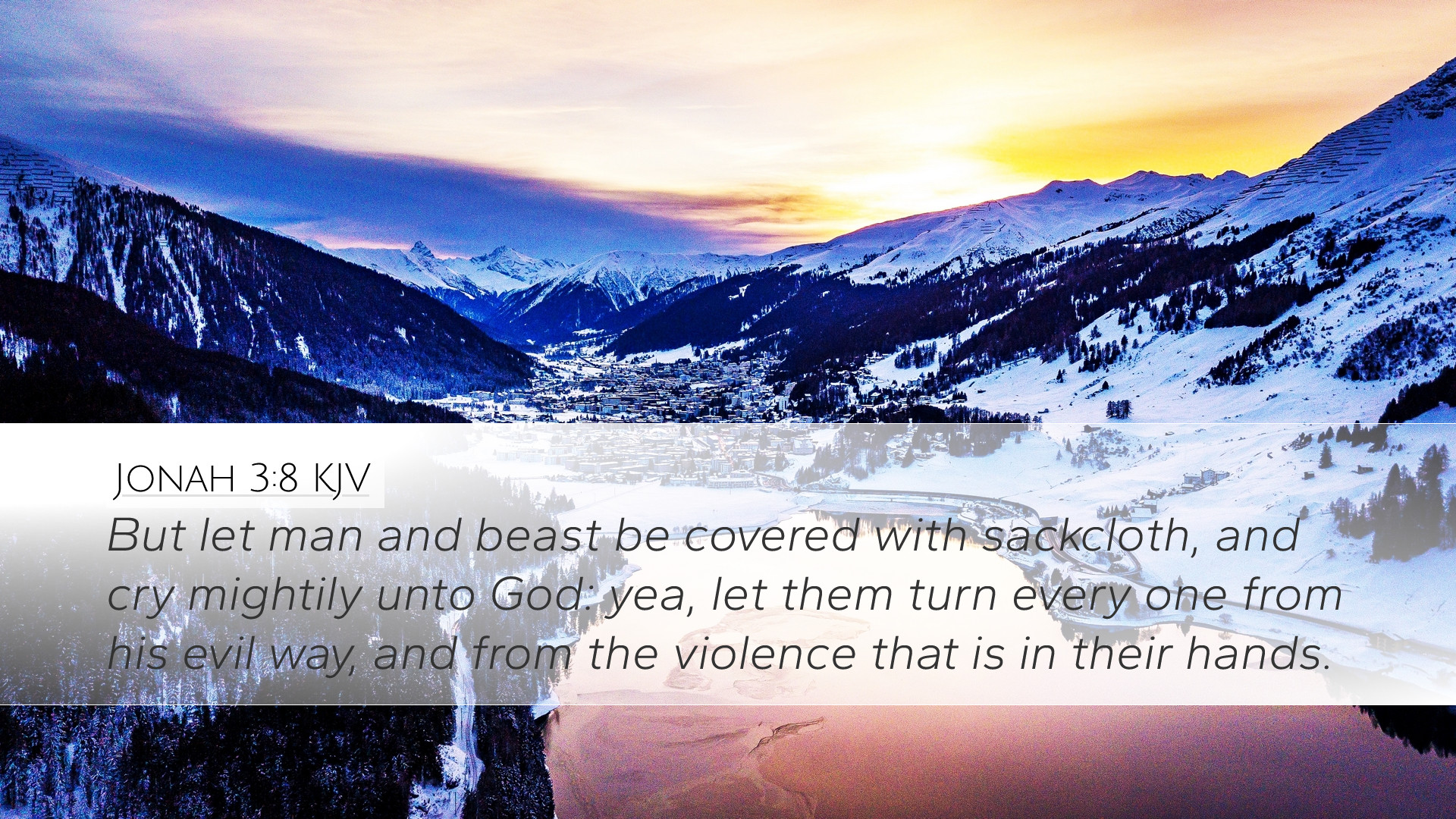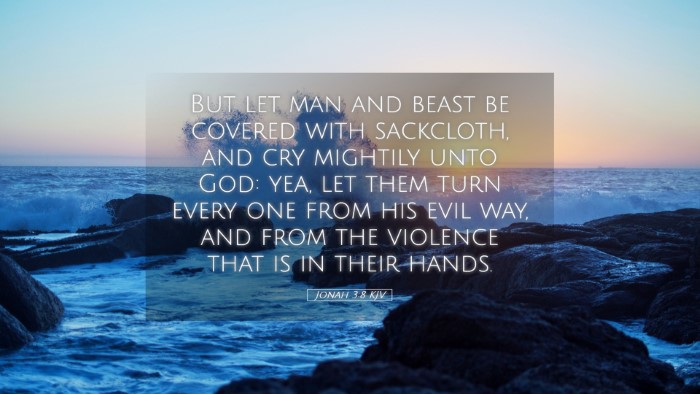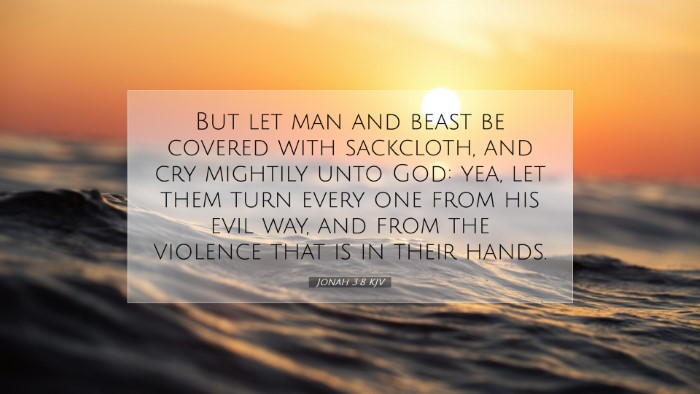Old Testament
Genesis Exodus Leviticus Numbers Deuteronomy Joshua Judges Ruth 1 Samuel 2 Samuel 1 Kings 2 Kings 1 Chronicles 2 Chronicles Ezra Nehemiah Esther Job Psalms Proverbs Ecclesiastes Song of Solomon Isaiah Jeremiah Lamentations Ezekiel Daniel Hosea Joel Amos Obadiah Jonah Micah Nahum Habakkuk Zephaniah Haggai Zechariah MalachiJonah 3:8
Jonah 3:8 KJV
But let man and beast be covered with sackcloth, and cry mightily unto God: yea, let them turn every one from his evil way, and from the violence that is in their hands.
Jonah 3:8 Bible Commentary
Commentary on Jonah 3:8
Verse (Jonah 3:8): "But let man and beast be covered with sackcloth, and cry mightily unto God: yea, let them turn every one from his evil way, and from the violence that is in their hands."
Introduction
The verse Jonah 3:8 marks a pivotal moment in the narrative of Jonah and the transformation of Nineveh. Here, we observe the King of Nineveh's decree, calling for both humans and animals to partake in a heartfelt act of repentance. This command reflects a profound understanding of the seriousness with which he approaches the impending judgment of God.
The Call to Repentance
The King's directive to cover "man and beast with sackcloth" signifies a communal repentance, emphasizing that the entire city—both people and animals—should express a genuine change of heart. This act of humility and mourning is profound in its inclusivity and seriousness.
- Symbol of Humility: Sackcloth has historically been associated with mourning and repentance in the biblical context. The act of wearing sackcloth signifies an acknowledgment of sin and a deep desire for mercy.
- Holistic Repentance: The inclusion of beasts in this act of penance indicates a recognition of the interconnectedness of creation. This shows the King’s intent to leave no stone unturned in seeking God's forgiveness.
The Science of Collective Mourning
The tradition of collective mourning is a biblical concept found throughout Scripture. When the people of Israel sought to turn back to God, they often engaged in acts that included the entire community. Matthew Henry notes that true repentance seeks not just personal but communal restoration.
Significance of Interdependence
Adam Clarke articulates that this interdependence underlines a principle that God’s judgment can affect more than just humanity; it highlights the ripple effect of sin. Hence, when a nation or community turns away from its transgressions, an acknowledgment of sin and collective contrition can lead to widespread divine mercy.
The Nature of True Repentance
The phrase "cry mightily unto God" underscores the urgency and earnestness of their appeal. It calls for a sincere and fervent cry to God, which reflects a recognition of their dire situation.
- Genuine Crying Out: The term 'mighty' suggests intensity in prayer and supplication. The people recognize that only through fervent prayer could they hope to elicit God’s compassion.
- Turning from Evil: The command to turn from "every one from his evil way" is crucial. True repentance requires a change of action and direction, as emphasized in the prophecies of Jeremiah (Jeremiah 25:5) and Ezekiel (Ezekiel 18:30).
Theological Reflections
The theological implications of Jonah 3:8 are significant for understanding God's mercy and justice:
- God's Justice: God's willingness to spare Nineveh demonstrates that His judgment is often accompanied by hope and an opportunity for repentance (Albert Barnes).
- Divine Mercy: The narrative illustrates that divine mercy extends to all of creation. Just as God sent Jonah to warn Nineveh, He sends messengers to warn and appeal to societies far and wide.
Application for Today
The lessons from Jonah 3:8 hold profound relevance for today's Church and its leaders:
- Collective Repentance: In a culture marked by individualism, this verse challenges us to embrace communal responsibility for societal sins.
- Urgency in Prayer: A reminder that earnestness in prayer and collective action is essential when seeking God's mercy in times of crisis.
Conclusion
Jonah 3:8 serves as a powerful reminder of the nature of repentance that is necessary for divine forgiveness. By emphasizing both individual and collective responsibility in addressing sin, the passage invites leaders and congregations to reflect on how they respond to spiritual crises. As we ponder the call to cover ourselves in sackcloth, cry out to God, and turn from our evil ways, we are reminded of God’s unwavering mercy for those who earnestly seek Him.


